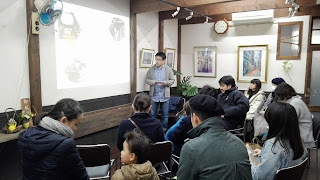Nagaya Tsunagu Forum, ("The 2nd forum on Japanese town houses, alleys and inbound ") by Karahori Club
On 18 February, Saturday, I participated in the 2nd forum as a MC and facilitator.
Last year I was a facilitator for the 1st forum. A topic of the 2nd forum
is nagaya, roji and inbound. Nagaya is a Japanese tenant houses in town.
In Karahori Area, located in the Uemachi Plateau, Osaka, there were many
this type of houses. During the WW2, this area was avoided from US airstrikes.
Consequently nagaya is fortunately remained. However, maintenance cost
for this is higher than construction cost for a new house. Many have already
distracted and renewed modern houses and apartments.
Despite that, some young Japanese come to start new business in nagaya
recently, but many of Nagaya residents are old Japanese.
Roji is an alley in Nagaya. The width in many Roji is less than 2 meters.
Roji has some unique functions, e.g. quasi-public spaces for community
and private spaces.
In the last 2-3 years, many foreign tourists, called inbound, have visited
Japan. (The term of "inbound" means tourists from outside Japan.)
Karahori Area is also exception for this. The number of accommodations
in the area rapidly increases and many tourists stay in this area nowadays.
The term of inbound for Nagaya residents was presumably defined as
new people including foreign tourists, Japanese business persons, etc.
when we discussed this topic.
We categorized as 7 types last year. This year, participants are residents,
business owners, guesthouse owners, university students, etc.
After my colleague put the open remark, he explained background for the
forum and what we discussed in the previous forum. Then another colleague
presented what Karahori Club did in 2016. Based upon the categories, then
we discussed some relevant topics.
Regarding advantages and disadvantages for nagaya, residents hear sounds,
noises and even smell from neighbours easily due to thin walls. However, once
some spaces are made , when these houses are renovated. One participant
said that noise from neighbours were almost gone.
Some foreign tourists show interests in nagaya. Despite the fact that they are
not majority, nagaya visitors' satisfactions are high according to several
participants. Business owners are also welcome when foreign tourists visit
their shops.
I impressed one comment form a participants. He talked about the meaning
of traveling. Foreign tourists come to a country to enjoy extraordinary things.
Some tourists really enjoy extraordinary things, e.g. Universal Studio Japan.
However, lives in nagaya is ordinary things for residents. For foreign tourists
their lives are extraordinary. Other tourists are interested in extraordinary from
ordinary. That is why they would like to visit nagaya. They are satisfied with
their visiting due to encountering local residents, who are friendly and kind.
Scenery in nagaya is also attractive to them. Staying in nagaya is sometimes
not cozy but one participant, who run a guesthouse, offers free public bath
service. Guests will go to sento, public bath, to take bath.
This occasion is quite precious to listen to voices from various people involved in
nagaya. Understanding lives in nagaya is important. Prosperity for nagaya
is not promised. We need is to speak out and post nagaya. As a result, mutual
understanding is promoted and more tourists show interests in nagaya.
Okay, I need to conclude my facilitation as well as discussion during the forum.
4 hours prior to the forum, I went back from Tokyo. I checked and created the
powerpoint document on Thursday. My colleague revised the paper nicely.
My partner took sick. I haven't got enough time to prepare after all.
Well some facilitations were bit weird, but overall it was good. Most participants
were happy. I appreciated staff and participants' support.




